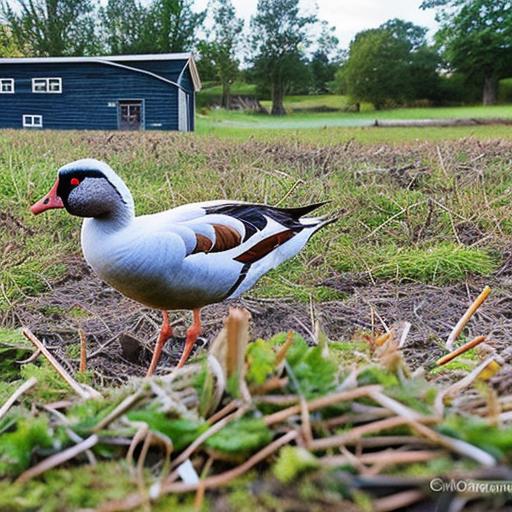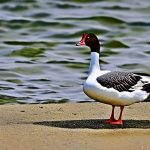Geese have a long history of being domesticated and raised on homesteads. They are believed to have been domesticated over 4,000 years ago in ancient Egypt and have since spread to various parts of the world. Geese are known for their distinctive honking sound and their ability to fly long distances. They are also highly social animals and are often seen in flocks.
Geese have several characteristics that make them suitable for homesteads. They are hardy birds that can adapt to different climates and environments. They are also excellent foragers and can help control pests in the garden. Additionally, geese are known for their meat, which is lean and flavorful, and their eggs, which are larger than chicken eggs and have a rich taste.
Key Takeaways
- Geese are social animals that require ample space, water, and food to thrive.
- Choosing the right breed of geese for your homestead depends on your goals and climate.
- Housing and fencing for geese should provide protection from predators and access to water.
- Feeding and watering geese requires a balanced diet and clean water sources.
- Common health issues for geese include respiratory infections and parasites, but can be prevented with proper care and management.
Choosing the Right Breed of Geese for Your Homestead
There are several popular breeds of geese that are suitable for homesteads. Some of the most common breeds include Toulouse, Embden, and African geese. When choosing a breed, it is important to consider factors such as climate, space availability, and intended purpose.
Toulouse geese are large birds that are known for their calm temperament and excellent meat production. They are also good egg layers and can produce around 30-40 eggs per year. Embden geese, on the other hand, are known for their white feathers and large size. They are also good meat producers and can lay around 25-35 eggs per year.
African geese are smaller in size compared to Toulouse and Embden geese but are known for their excellent egg production. They can lay up to 50-60 eggs per year. African geese are also good foragers and can help control pests in the garden.
Housing and Fencing for Geese: Tips and Tricks
Geese require proper housing and fencing to ensure their safety and well-being. When it comes to housing, there are several options to choose from. One option is a simple shelter made of wood or metal, with a raised floor and a roof to protect the geese from the elements. Another option is a portable shelter, which can be moved around the homestead to provide fresh grazing areas for the geese.
When building a goose house, it is important to consider the materials needed. The house should be sturdy and predator-proof, with secure doors and windows. It should also have proper ventilation to prevent the buildup of moisture and ammonia. Additionally, the house should have nesting boxes for the geese to lay their eggs.
Fencing is also important for keeping geese safe from predators and preventing them from wandering off. A fence should be at least 3-4 feet high and made of sturdy materials such as wire or electric fencing. It should also be buried at least 6 inches into the ground to prevent predators from digging under it.
Feeding and Watering Geese: What to Know
Geese have specific dietary needs that must be met in order for them to thrive. They are herbivores and primarily eat grass, weeds, and other vegetation. They also enjoy foraging for insects, snails, and worms. In addition to their natural diet, geese can be supplemented with grains, such as corn or wheat, as well as fruits and vegetables.
When it comes to feeding geese, it is important to provide them with enough food to meet their nutritional needs. On average, an adult goose will consume around 1-2 pounds of food per day. It is best to feed geese twice a day, in the morning and evening, to ensure they have enough energy throughout the day.
In addition to food, geese also require clean water for drinking and bathing. They should have access to fresh water at all times, and the water should be changed regularly to prevent the buildup of bacteria. Geese also enjoy swimming, so providing them with a shallow pond or pool can help keep them happy and healthy.
Health and Wellness of Geese: Common Issues and Solutions
Like any livestock, geese can experience health issues that need to be addressed. Some common health issues in geese include respiratory infections, parasites, and foot problems. Respiratory infections can be caused by poor ventilation or exposure to cold and damp conditions. Parasites, such as lice and mites, can cause itching and discomfort for the geese. Foot problems, such as bumblefoot, can occur if the geese are kept on hard surfaces for extended periods of time.
To prevent and treat health issues in geese, it is important to provide them with a clean and dry living environment. Regular cleaning of the goose house and bedding can help prevent the buildup of bacteria and parasites. It is also important to provide proper nutrition and access to fresh water. If a goose does become sick, it is best to consult a veterinarian who specializes in poultry to determine the best course of treatment.
Keeping geese healthy and happy also involves providing them with mental stimulation and social interaction. Geese are highly social animals and thrive when they have companionship. They should be allowed to interact with other geese or other livestock on the homestead. Providing them with toys or objects to peck at can also help keep them entertained.
Geese and Other Livestock: Coexisting on the Homestead

Geese can coexist well with other livestock on a homestead, such as chickens, ducks, or goats. However, it is important to introduce them slowly and carefully to prevent any conflicts or injuries.
When introducing geese to other animals, it is best to do so when they are young. This allows them to grow up together and become accustomed to each other’s presence. It is also important to provide enough space for each animal to have their own territory and resources, such as food and water.
Having geese on a homestead with other livestock can have several benefits. Geese can help control pests in the garden, such as slugs and snails, which can be harmful to plants. They can also help keep the grass and weeds in check, reducing the need for mowing or weed control. Additionally, geese can provide companionship and entertainment for other animals, making the homestead a more enjoyable place for everyone.
Geese and the Garden: How to Manage Their Impact
While geese can be beneficial in the garden by controlling pests, they can also cause damage if not properly managed. Geese are known for their grazing habits and can eat large amounts of grass and vegetation. This can be a problem if they are allowed unrestricted access to the garden.
To manage the impact of geese in the garden, it is important to provide them with alternative grazing areas. This can be done by fencing off certain areas of the garden or providing them with a separate grazing area. It is also important to rotate their grazing areas to prevent overgrazing and allow the vegetation to recover.
Another way to manage the impact of geese in the garden is by using deterrents. This can include placing scarecrows or reflective objects in the garden to deter the geese from entering. It can also involve using noise-making devices or sprinklers that activate when the geese approach.
Despite their potential impact on the garden, having geese in the garden can also have benefits. As mentioned earlier, they can help control pests and reduce the need for chemical pesticides. They can also provide natural fertilizer through their droppings, which can improve soil fertility and plant growth.
Breeding and Hatching Geese: Best Practices
Breeding geese can be a rewarding experience on a homestead. To breed geese, it is important to have a male and female of the same breed. The male, known as a gander, will mate with the female, known as a goose, to fertilize the eggs.
Once the eggs are fertilized, they can be collected and incubated to hatch goslings. Goose eggs take around 28-35 days to hatch, depending on the breed. During this time, it is important to provide proper temperature and humidity levels in the incubator to ensure successful hatching.
After hatching, goslings should be kept in a warm and safe environment. They should have access to clean water and a balanced diet to support their growth and development. It is also important to provide them with proper socialization and interaction with other geese or animals.
Raising Geese for Meat or Eggs: What You Need to Know
Raising geese for meat or eggs can be a profitable venture on a homestead. Geese are known for their lean and flavorful meat, which is often compared to duck or beef. They are also good egg layers and can produce larger eggs with a rich taste.
To raise geese for meat or eggs, it is important to provide them with proper nutrition and care. They should have access to a balanced diet that includes grains, fruits, vegetables, and plenty of fresh water. It is also important to provide them with enough space to move around and exercise.
When it comes to processing geese for meat, it is best to do so when they are around 4-6 months old. This allows them to reach their full size and develop the desired amount of fat. The meat can be processed at home or taken to a local butcher for professional processing.
Selling Geese and Their Products: A Guide to Marketing Your Homestead Goods
Selling geese and their products can be a profitable venture on a homestead. There are several ways to market geese and their products, including selling them directly to consumers, selling them at farmers markets or local fairs, or selling them online.
When marketing geese and their products, it is important to highlight their unique qualities and benefits. This can include emphasizing the lean and flavorful meat, the larger and richer-tasting eggs, or the natural pest control they provide in the garden. It is also important to provide clear and accurate information about the breed, feeding practices, and living conditions of the geese.
Tips for selling geese and their products include building relationships with local restaurants or chefs who may be interested in purchasing fresh, locally-raised geese. It is also important to have proper packaging and labeling for the products, as well as clear pricing and payment options.
Selling geese and their products on a homestead can have several benefits. It can provide an additional source of income for the homestead, as well as help promote sustainable and ethical farming practices. It can also help build connections with the local community and raise awareness about the importance of supporting local agriculture.
If you’re interested in learning more about keeping geese on your modern homestead, you may also find this article on how to insulate a chicken coop from Poultry Wizard helpful. Insulating your coop can provide a comfortable and safe environment for your geese, especially during colder months. Check out the article here for valuable tips and techniques to keep your geese cozy and protected.
FAQs
What is a homesteader?
A homesteader is someone who lives a self-sufficient lifestyle, often on a farm or rural property, and grows their own food and raises livestock.
Why keep geese on a homestead?
Geese are great for pest control, as they eat insects and weeds. They also provide meat, eggs, and feathers for homesteaders.
What are the benefits of keeping geese?
Geese are hardy and low-maintenance animals that can thrive in a variety of climates. They are also social creatures that can provide companionship for other livestock and humans.
What do geese eat?
Geese are primarily herbivores and eat grass, weeds, and other vegetation. They also enjoy grains and can be fed a commercial poultry feed.
How do you care for geese?
Geese require access to fresh water, shelter, and a secure area to roam. They also need regular grooming and veterinary care.
What are some common health issues for geese?
Geese can be susceptible to respiratory infections, parasites, and foot problems. It is important to provide them with a clean and dry living environment and to seek veterinary care if necessary.
Can geese be raised with other livestock?
Geese can be raised with other poultry, such as chickens and ducks, but may not get along with larger animals like cows or horses. It is important to introduce them slowly and monitor their interactions.
What are some uses for goose feathers?
Goose feathers can be used for insulation, pillows, and clothing. They are also popular for fly tying in fishing.
Meet Walter, the feathered-friend fanatic of Florida! Nestled in the sunshine state, Walter struts through life with his feathered companions, clucking his way to happiness. With a coop that’s fancier than a five-star hotel, he’s the Don Juan of the chicken world. When he’s not teaching his hens to do the cha-cha, you’ll find him in a heated debate with his prized rooster, Sir Clucks-a-Lot. Walter’s poultry passion is no yolk; he’s the sunny-side-up guy you never knew you needed in your flock of friends!







